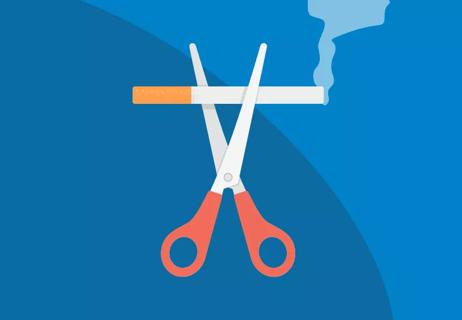Cigarettes increase your risk of developing the condition and worsening its effects

It’s not exactly difficult to connect a negative health outcome to smoking. That’s why 11 different warning labels appear on cigarette packs to emphasize the health risks that come with lighting up.
Advertisement
Cleveland Clinic is a non-profit academic medical center. Advertising on our site helps support our mission. We do not endorse non-Cleveland Clinic products or services. Policy
One of those warnings links smoking to the onset of Type 2 diabetes, a life-altering condition with long-term health implications.
Smoking also worsens the effects of diabetes if you have the illness. (Hardly a surprise, right?)
Let’s take a closer look at the relationship between smoking and diabetes with Shannon Knapp, MEd, BSN, RN, CDCES, who’s the manager of diabetes care and education at Cleveland Clinic.
Let’s start with some numbers.
People who smoke are 30% to 40% more likely to develop Type 2 diabetes compared to those who don’t puff away on cigarettes, according to the U.S. Centers for Disease Control and Prevention (CDC).
Smoke more and your risk level for diabetes increases, too. “It’s a pretty strong connection,” states Knapp.
Here’s why.
Your pancreas is an endocrine gland that releases a substance called insulin, which helps your body’s cells absorb blood sugar. Maintaining balanced blood sugar levels is essential for your body to function.
Nicotine disrupts that process by changing the way your cells react to insulin, which elevates blood sugar to unhealthy levels.
Diabetes, as you probably know, is a disease of the pancreas. When a person has diabetes, their pancreas either doesn’t make insulin, doesn’t make enough insulin or the insulin doesn’t work properly.
Advertisement
Smoking a cigarette releases more than 7,000 chemicals, including some that qualify as toxic. A U.S. Food and Drug Administration (FDA) list of harmful and potentially harmful constituents (HPHCs) in cigarettes features 93 entries.
As you might imagine, your body doesn’t respond well to these chemicals. These toxins ravage cells in your body to the point where they may stop responding to insulin.
Smoking is hardly the only thing that can increase your chances of developing Type 2 diabetes. There’s a long list of risk factors tied to genetics, medical history and lifestyle.
But if you have any of those added risk factors and smoke … well, your likelihood of getting diabetes escalates quickly given the stress smoking places on your body, says Knapp.
Risk factors for Type 2 diabetes include:
Smoking can make managing diabetes much more difficult. As mentioned, nicotine naturally increases blood sugar levels. So, if you smoke and have diabetes, you’ll probably need larger doses of insulin to manage your blood sugar, explains Knapp.
In addition, smoking can worsen potential complications of diabetes such as:
And of course, smoking in and of itself is just bad for you — a fact that’s pretty much indisputable at this point. The habit can lead to various cancers, stroke, heart attack and more health issues.
Absolutely! In fact, the FDA reports that insulin can become more effective at reducing your blood sugar within eight weeks after snuffing out your final cigarette. Add that to the list of amazing things that happen to your body after you quit smoking.
Now some research does show an increased risk of Type 2 diabetes in the short term after smoking cessation. This is most likely connected to weight gain during that time, which increases your risk for diabetes.
“But that increase in weight isn’t enough to negate the cardiovascular benefits of not smoking,” reassures Knapp. (Taking a more holistic approach to smoking cessation by adding physical activity and eating healthier may help prevent weight gain, too.)
Advertisement
Will it be easy to kick your smoking habit? No. The nicotine in tobacco makes smoking highly addictive.
But quitting can be done with a plan, a strong support system and a desire to be healthier. Talk to a healthcare provider about a smoking cessation program. There are online services to quit smoking, too.
“Certain diabetes risk factors like age, family history and ethnicity cannot be changed, but quitting smoking can help reduce your risk,” encourages Knapp.
Advertisement

Sign up for our Health Essentials emails for expert guidance on nutrition, fitness, sleep, skin care and more.
Learn more about our editorial process.
Advertisement

Vaping exposes you to thousands of chemicals, including many that are known to cause cancer and lung disease

Smoking can make symptoms from cancer treatment worse, and can even make treatments less effective

From dental diseases to cardiovascular problems, the harmful effects of smoking hookah have plenty of downsides for your health

Even only a couple cigarettes a day can lead to potentially deadly lung diseases like COPD and emphysema

Your risk goes down once you quit, but you may still need a lung cancer screening

Health benefits start within 20 minutes and continue to grow for years after

Each comes with substantial health risks and should be avoided

Smoking and vaping deplete oxygen-rich blood that you need for endurance and fitness

Even small moments of time outdoors can help reduce stress, boost mood and restore a sense of calm

A correct prescription helps your eyes see clearly — but as natural changes occur, you may need stronger or different eyeglasses

Both are medical emergencies, but they are very distinct events with different causes